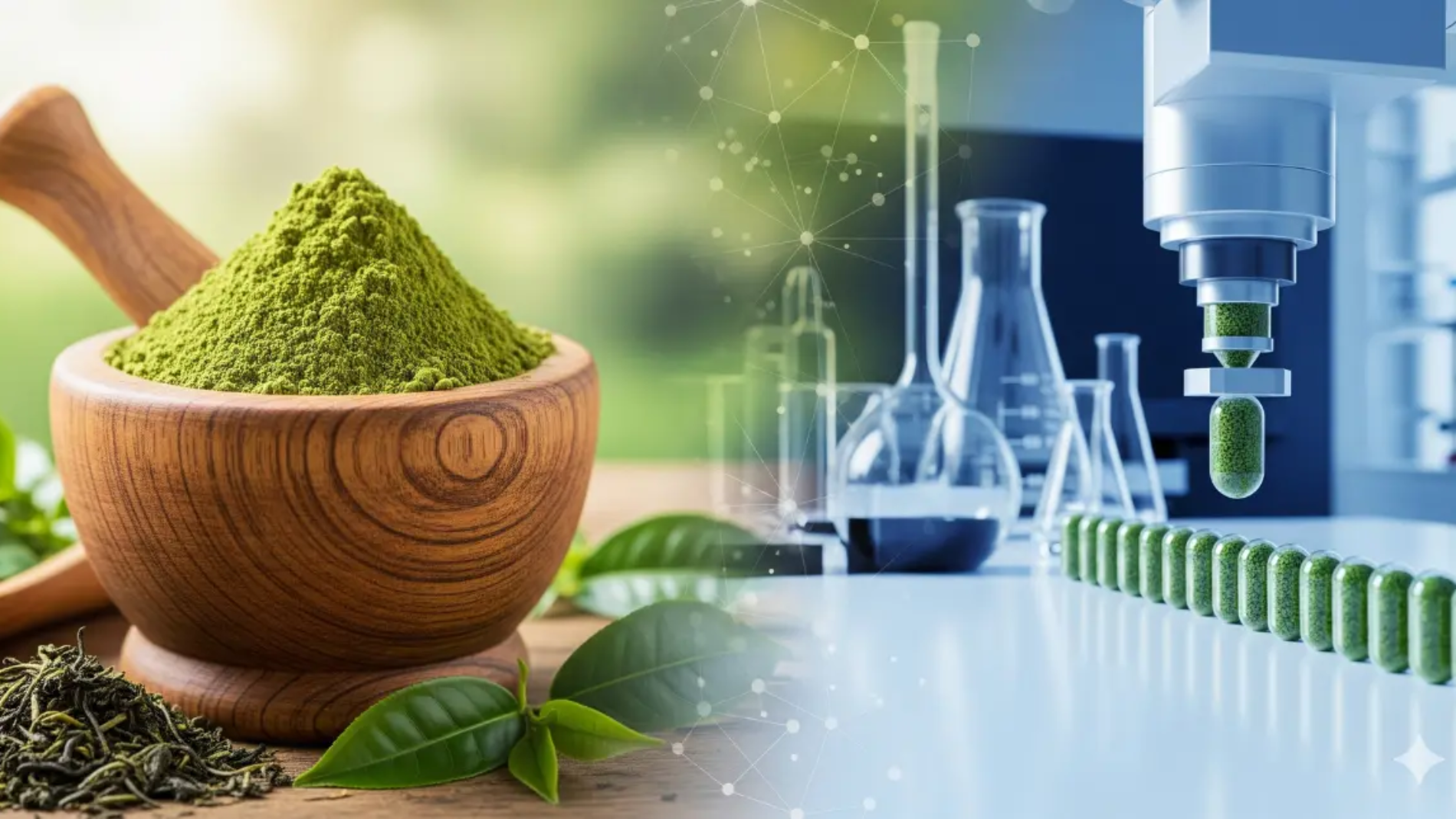The nutraceutical market is experiencing unprecedented growth, driven by a global consumer base increasingly focused on proactive health and wellness. In this dynamic industry, ingredient selection is paramount. Brands are not just looking for efficacy; they’re looking for natural origin, purity, and scientific backing. This rigorous demand has propelled one ingredient to the forefront: Organic Green Tea Powder.
Far beyond a simple beverage, this vibrant green powder is a powerhouse of beneficial compounds, offering a compelling blend of health benefits, clean-label appeal, and formulation versatility. For nutraceutical brands, incorporating organic green tea powder into their blends is no longer just an option—it’s a strategic imperative. From our perspective in Pune, a hub for both traditional and modern health ingredients, we’ve observed this shift firsthand.
1. A Potent Source of Bioactive Compounds
The primary allure of green tea lies in its rich concentration of polyphenols, particularly catechins. Among these, Epigallocatechin Gallate (EGCG) stands out as the most abundant and potent, responsible for many of green tea’s celebrated health benefits.
Nutraceutical brands leverage organic green tea powder to deliver:
Antioxidant Power: EGCG is a powerful antioxidant, combating oxidative stress and supporting cellular health.
Metabolic Support: Studies suggest green tea catechins can aid in metabolism and fat oxidation, making it popular in weight management supplements.
Cardiovascular Health: Regular intake is associated with improved heart health markers.
The “organic” certification ensures these precious compounds are free from pesticide residues, adding an extra layer of purity that discerning health brands and consumers demand.
2. The Cognitive Edge: L-Theanine for Focus and Calm
Beyond the physical benefits, organic green tea powder offers a unique advantage for cognitive health: L-Theanine. This amino acid, naturally present in green tea leaves, is renowned for its ability to promote a state of “alert calmness.”
Unlike the jitteriness sometimes associated with caffeine, L-Theanine works synergistically with green tea’s natural caffeine to:
Improve Focus: Enhancing attention and cognitive performance.
Reduce Stress: Promoting relaxation without drowsiness.
Boost Mood: Contributing to a sense of well-being.
This makes organic green tea powder an ideal ingredient for nootropic supplements, stress-relief formulas, and cognitive enhancers, catering to the growing market for mental wellness products.
Spice Up Your Business with Authentic Indian Flavors
Import and Export Excellence from India!

3. Clean Label & Natural Appeal
In the nutraceutical space, transparency is key. Consumers scrutinize ingredient lists, favoring natural, recognizable components over synthetic additives. Organic Green Tea Powder fits this paradigm perfectly.
As a single-ingredient, plant-derived product, it aligns seamlessly with clean label trends. The USDA organic or EU organic certified status provides undeniable proof of its purity and sustainable sourcing. This allows brands to build trust, communicate natural efficacy, and avoid the “chemical soup” perception that can deter health-conscious buyers.
4. Versatile Formulation for Diverse Product Lines
Organic green tea powder is remarkably versatile, allowing nutraceutical brands to incorporate it into a wide array of product formats:
Capsules & Tablets: As a concentrated extract for daily supplementation.
Protein Powders & Meal Replacements: Adding functional benefits and a subtle, earthy flavour.
Functional Beverages: In powder mixes or ready-to-drink formulations for energy, focus, or antioxidant support.
Nutritional Bars & Snacks: Enhancing the health profile of convenient food items.
Its fine texture and good dispersibility (especially high-qualityculinary grade green tea powder make it easy to blend into various matrices, ensuring consistent dosing and consumer experience.
5. Sustainable Sourcing & Ethical Consumerism
The “organic” label extends beyond just product purity; it signifies a commitment to sustainable agricultural practices. Nutraceutical brands are increasingly aware that consumers care not just about what’s in a product, but also how it’s made.
Sourcing organic green tea powder from India allows brands to align with ethical and environmentally responsible practices, tapping into a supply chain that often supports local communities and promotes biodiversity. This narrative of sustainability and ethical sourcing adds significant brand value in a market driven by conscientious consumers.
In conclusion, organic green tea powder is more than just an ingredient; it’s a strategic asset for nutraceutical brands. Its potent bioactive compounds, cognitive benefits, clean-label appeal, formulation versatility, and sustainable sourcing profile make it an indispensable choice for creating innovative and highly desirable wellness products.
Frequently Asked Questions (FAQs)
1. What is the typical EGCG content in organic green tea powder?
The EGCG content can vary depending on the tea variety, harvest time, and processing. High-quality organic green tea powder typically ranges from 15-25% EGCG, which should be specified on the Certificate of Analysis (COA).
2. Is there a difference between organic green tea powder and matcha?
Yes, while both are powdered green teas, matcha is typically from shade-grown leaves, processed differently, and traditionally used ceremonially. Organic green tea powder (often culinary grade) is more broadly used as a versatile ingredient in food and nutraceuticals due to its cost-effectiveness and functional properties.
3. Can I use organic green tea powder in products for children?
Due to its natural caffeine content, it’s generally recommended to consult with a pediatrician before adding significant amounts of organic green tea powder to products intended for children. Low doses might be acceptable, but it depends on the child’s age and sensitivity.
4. How does L-Theanine in green tea powder benefit mental clarity?
L-Theanine crosses the blood-brain barrier and can increase alpha brain wave activity, which is associated with a relaxed but alert state. It also influences neurotransmitters like dopamine and serotonin, contributing to improved focus and mood.
5. What certifications should I look for when sourcing bulk organic green tea powder?
Key certifications include USDA Organic (for the U.S. market), EU Organic (for the European market), and India Organic (for products originating from India). These ensure compliance with strict organic standards.
6. Does the origin (e.g., Assam, Nilgiri) affect the properties of organic green tea powder?
Yes, just like wine, tea’s characteristics are influenced by its terroir. While all green tea powders share core benefits, those from specific regions like Nilgiri (known for its fragrant teas) or Assam might offer slightly different flavour notes or subtle variations in compound profiles.
7. How much caffeine is in organic green tea powder?
The caffeine content varies but is generally lower than coffee. A typical serving (e.g., 1-2 grams) might contain 20-50mg of caffeine, which should be factored into your product’s total caffeine count.
8. What’s the best way to preserve the potency of organic green tea powder?
Store it in an airtight container in a cool, dark, and dry place. Light, heat, and moisture can degrade its delicate compounds, especially EGCG. Some manufacturers also use nitrogen-flushed packaging for extended freshness.



Leave A Comment